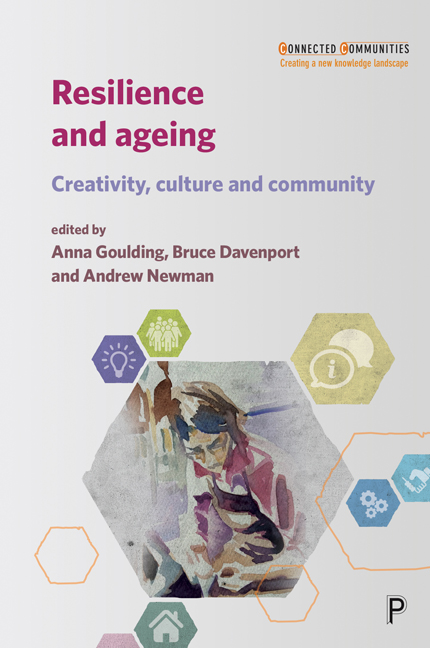Book contents
- Frontmatter
- Contents
- List of figures, tables and boxes
- Notes on contributors
- Series editors’ foreword
- Introduction
- one Setting the field: older people’s conceptualisation of resilience and its relationship to cultural engagement
- two Ages and Stages: creative participatory research with older people
- three Social connectivity and creative approaches to dementia care: the case of a poetry intervention
- four Narrative identity and resilience for people in later life with dementia living in care homes: the role of visual arts enrichment activities
- five After the earthquake: narratives of resilience, re-signification of fear and revitalisation of local identities in rural communities of Paredones, Chile
- six Integrating sense of place within new housing developments: a community-based participatory research approach
- seven Ageing in place: creativity and resilience in neighbourhoods
- eight Crafting resilience for later life
- nine Oral histories and lacemaking as strategies for resilience in women’s craft groups
- ten Objects of loss: resilience, continuity and learning in material culture relationships
- eleven Later-life gardening in a retirement community: sites of identity, resilience and creativity
- Index
ten - Objects of loss: resilience, continuity and learning in material culture relationships
Published online by Cambridge University Press: 19 April 2022
- Frontmatter
- Contents
- List of figures, tables and boxes
- Notes on contributors
- Series editors’ foreword
- Introduction
- one Setting the field: older people’s conceptualisation of resilience and its relationship to cultural engagement
- two Ages and Stages: creative participatory research with older people
- three Social connectivity and creative approaches to dementia care: the case of a poetry intervention
- four Narrative identity and resilience for people in later life with dementia living in care homes: the role of visual arts enrichment activities
- five After the earthquake: narratives of resilience, re-signification of fear and revitalisation of local identities in rural communities of Paredones, Chile
- six Integrating sense of place within new housing developments: a community-based participatory research approach
- seven Ageing in place: creativity and resilience in neighbourhoods
- eight Crafting resilience for later life
- nine Oral histories and lacemaking as strategies for resilience in women’s craft groups
- ten Objects of loss: resilience, continuity and learning in material culture relationships
- eleven Later-life gardening in a retirement community: sites of identity, resilience and creativity
- Index
Summary
Editorial introduction
This chapter explore resilience as a response to the ordinary experiences of loss in later life: loss of relationships, loss of a home and loss of objects. Objects, or their absence, feature prominently here. Material culture studies looks at the role objects have in supporting human relationships and memories. Creativity is primarily discussed in terms of the everyday processes of curating objects (and, hence, curating memories and relationships). However, creativity also appears in the research methods that were used to draw out the participants’ stories, revealing this intersection of resilience, material culture and everyday creativity.
Introduction
The discussion in this chapter critically explores resilience, learning (as a process of being and becoming fully human) (Gill, 2014) and everyday creativity through self-curation in the context of the process of decluttering as a response to loss. Although consumer societies’ concern with materialism has long been seen as detrimental to the quality of human relationships, Miller (2008, p 1) points out that ‘the closer our relationships are with objects, the closer our relationships are with people’. How are our relationships with people, places and things affected through loss over time, and is that resulting absence tangible, emotional or somehow both? How does loss change and transform us as we age? Absence and loss are not merely emptiness or a state of non- or no-longer-being. Instead, absence is ‘something performed, textured and materialised through relations and processes, and via objects’ (Meyer, 2012, p 103). Meyer goes on to suggest:
Although, strictly speaking, absence is a thing without matter, absence is ordered, remembered, evoked and made discussable and sufferable through materialities. And even though absence escapes – and can only ever be partially and temporarily contained in – certain places, it is within these places and through leaving various kinds of traces that absence comes to matter. (Meyer, 2012, p 109)
Within the broader context of this discussion, the constructs of resilience and self-curation are problematic in themselves as descriptors of what happens when lives are lived through profound experiences of loss over time and in particularly resonant places.
- Type
- Chapter
- Information
- Resilience and AgeingCreativity, Culture and Community, pp. 227 - 248Publisher: Bristol University PressPrint publication year: 2018



